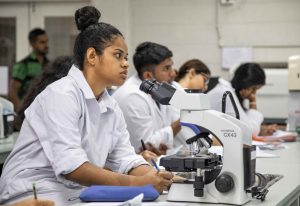

An FNU student listens attentively during a lab class.
More girls are in school today than ever before, but they don’t always have the same opportunities as boys to complete and benefit from an education of their choice. Too many girls and women are inhibited by biases, social norms and expectations that influence the quality of the educations they receive and the subjects they study.
Females are particularly under-represented in science, technology, engineering and mathematics (STEM) education, and consequently in STEM careers.
STEM occupations are expected to undergo rapid growth in the coming decade. Technology and engineering are among the most sought-after skills; however, a gender gap in STEM persists across the world.

Professor Tibor Pasinszki.
This gap begins with education, fueled by gender stereotypes and expectations regarding “women’s work.” Despite similar achievement scores between female and male children in math and science, males are the overwhelming majority of students studying STEM fields in tertiary education. The few women who begin careers in STEM face male-dominated workplaces with frequent discrimination.
Women leave STEM careers at disproportionately higher rates than men, particularly those who are working parents. Systems of bias that push women out of STEM careers can also influence the products and services created by STEM organisations. Dedicated organisational strategies to recruit, retain, and advance women in STEM occupations can help address these issues.
Although individual women would obviously benefit from more inclusive atmospheres in STEM fields, these fields as a whole can also benefit by becoming more inclusive. Science functions best when it considers a wide range of diverse perspectives.
Scientific fields that exclude women forgo many talented future scientists, as well as fresh perspectives to old problems. Generally, sociological research has shown that diverse workplaces are happier and more productive, suggesting that STEM organisations would perform by being more gender inclusive.
Professor Tibor Pasinszki
Acting Dean
College of Engineering, Science and Technology
Fiji National University